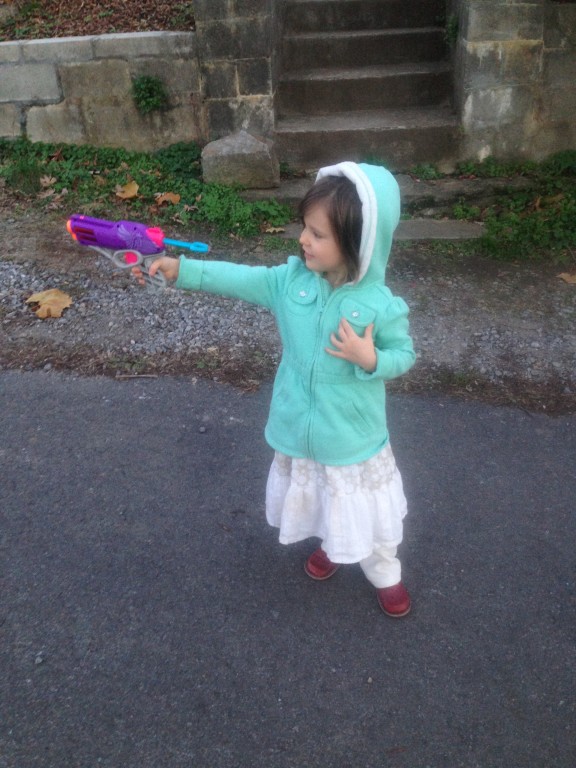My three and a half year old daughter, donning her best Princess Leia dress (just a regular dress, only two sizes too big) and rain boots, muddy from stomping in the creek, made her way up to the top of the hill where I stood. The sun was setting at the park, and I’d called to her and her brother to tell them it was time to go home. Of course they were unhappy at this pronouncement, and they both grumbled as they climbed—my son and his pals up one side, my daughter solo on the other. A fellow parent—looking for his own child—had followed me. When he saw and heard my daughter in all her glory, he laughed in surprise and said “Well, she’s got a mind of her own, doesn’t she?”

Let’s just say this—you know, so it’s out of the way. What the heck kind of comment is that? Of course she has a mind of her own . . . she’s a person. Don’t all people have minds of their own? Are people sharing minds now? That’s the kind of thing you say about, say, an appliance that doesn’t work properly. “Well, that vacuum cleaner has a mind of its own!” It makes absolutely zero sense when discussing a living human being. Despite the super weird way he said it, the message rang out loud and clear: She’s a little girl, yet she’s thinking for herself and doing her own thing. And in this world? That’s just a whole lotta crazy.
Never mind the fact that both of my children were complaining. Both of my children were covered in mud. And both of my children had attempted escape through the woods when they first saw me coming. It wasn’t my son who got the surprised father remarking on his appearance—or his attitude. It was my daughter. Let’s face it, moms. We’re still trying to raise our little girls in a patriarchal society. As far as we’ve evolved (hey, at least our daughters will be able to vote some day!), we still have leagues to go before we achieve equality.
The disparaging attitude toward women starts as soon as we see that vagina on the ultrasound and Grandma mails that pink onesie that says “I’m cute.” The message our girls are receiving from the time they are born is this: even though boys may get away with being tough (to the point of bordering on obnoxious), adventurous and curious, exploratory and entrepreneurial, I am still expected to be demure, sweet, quiet, and beautiful.
Sadly, I can’t blame random dads at the park (or at least, not entirely). A few weeks ago, my daughter and I played a game of her choice. In it, I was the “friend,” and she was me, and we both had babies. She came over and knocked on my door (the wall separating the kitchen from the living room, of course). She then popped her head into the room and said, “When you answer the door, give me a hug and tell me I look cute.”
Well. That was eye-opening. Until that moment, I considered myself highly enlightened in this area: I’ve made a point not to tell my daughter (or my friends’ daughters) how “cute” they look and not to comment exclusively on their clothes or hair. I’ve read articles and blog posts on how to talk to girls (“What book are you reading right now?” “What’s your favorite subject in school?”). I’ve specifically let my daughter dress herself—never dictating what she should look like. I rarely comment on her appearance, and I certainly never do so to the exclusion of her other qualities. Yet despite all of that, my daughter observed something I didn’t even notice myself doing: commenting immediately on my friends’ appearances. We use “You look nice!” “Is that a new sweater?” “Cute hair!” “I love your necklace!” as almost an icebreaker. It’s not the only thing we talk about, of course, but it’s the first thing my daughter hears when we meet girlfriends. I say girlfriends because it’s important to note that I do not make similar comments when I greet my friends who are men. I ask them about work or how their hobbies are going. In other words, I too am guilty. I’m part of the system which I find so abysmally broken. My daughter observed that and, at three years old, began parroting it.
Objectification is tricky. It can be loud and in your face (for example, movies about jocks usually have cliched scenes in which the guys engage in some unsavory “locker room talk”), it can be loud from the next table over (where yesterday, I swear, three men were separating women from their office into “hot” and “ugly” categories loudly enough for my children to hear them), but it can also be subtle—seeping in through the cracks where you least expect it: a father remarking on my daughter having her own mind or my daughter recognizing my tendency to comment on how “cute” my friends look.
The fact is that it’s still a man’s world out there. It’s still a world where women are not largely celebrated for their brains, but rather for their appearance. We parents have to practice constant vigilance to make sure our daughters recognize their worth and grow up to be proud to have “a mind of her own.” Yes, my daughter is beautiful. Yes, she is cute and sweet. She is also funny, stubborn, adventurous, creative, and smart. Maybe the world will only remind her of the former, but it’s my job—as her mother—to remind her of the latter. That means I have to check myself, pay attention to what I say in her presence, and watch where I place importance.
At the park that day, I smiled to myself as we walked back up to our car. I looked down at my daughter (who was still a bit angry that we were leaving) still covered in mud in a dress that was hanging off her little body. She can be anything. She can be everything. She just needs to have that mind of her own. And I am going to try my hardest to create a world for her that celebrates it.
















